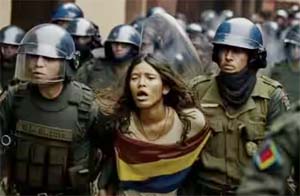World Desk : dhakamirror.com
The systemic brutality used by Colombian police to bring down nationwide protests in 2021 was unfeigned and well-documented, but the images Amnesty International recently used to draw attention to the issue were fake, as per a Guardian report.
The international human rights advocacy organisation has since taken down the images that were posted in response to criticism for using AI-generated images to promote stories on social media.
The pictures show scenes from the protests that erupted in Colombia in 2021, including one in which a woman is being dragged away by police.
However, even a fleeting glance at the images reveals that something is fishy.
The image has a dystopian feel to it due to the smoothed-off and warped faces of the police and protesters, points out the Guardian report.
The protester’s tricolour contains the correct colours—red, yellow, and blue—but they are arranged incorrectly, and the police uniform is now obsolete.
Numerous cases of violence, sexual harassment, and torture committed by Colombian police during the unrest wave of 2021 have been documented by Amnesty and other observers.
Their research has increased awareness of Colombian police brutality and helped to solidify public support for reform.
However, media scholars and photojournalists have issued warnings that the use of AI-generated image could undermine Amnesty’s own work and promote conspiracies.
“We are living in a highly polarised era full of fake news, which makes people question the credibility of the media. And as we know, artificial intelligence lies. What sort of credibility do you have when you start publishing images created by artificial intelligence?” said Juancho Torres, a photojournalist based in Bogotá who spoke to The Guardian.
The 2021 national strike, which was initiated by a divisive tax reform and subsequently stoked by the brutal police response, resulted in at least 38 civilian deaths at the hands of state authorities.
Women were kidnapped, carried to abandoned buildings, and raped by gangs of policemen in cases reported by the Bogota-based Temblores.
As per Amnesty International, it has previously used photos in its reports but decided to put to use the AI-generated visuals to shield demonstrators from potential governmental retaliation.
“We have removed the images from social media posts, as we don’t want the criticism for the use of AI-generated images to distract from the core message in support of the victims and their calls for justice in Colombia,” Erika Guevara Rosas, director for Americas at Amnesty told The Guardian.
Torres added that Amnesty’s use of AI-generated photographs was disrespectful to photojournalists who cover protests from the frontline.



















